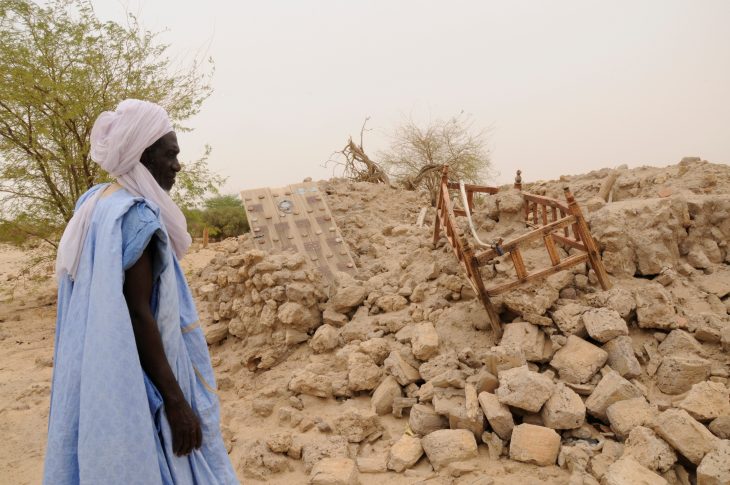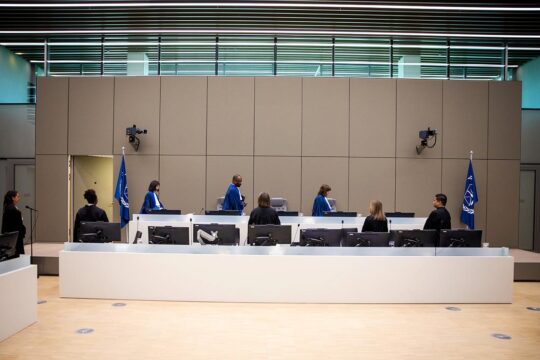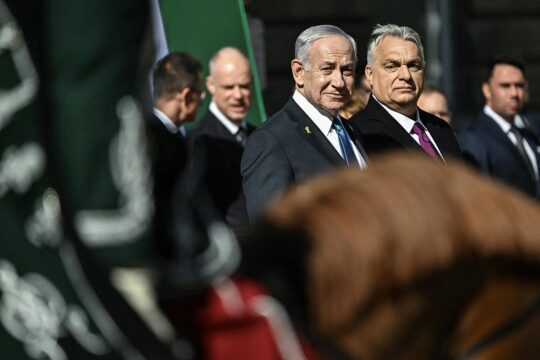The International Criminal Court (ICC) wrapped up in three days the trial of Malian former Jihadist Ahmed Al Faqi Al Mahdi, who faces one charge of war crimes for destruction of historic and religious buildings in Timbuktu in June and July 2012. The Accused pleaded guilty, asked victims for forgiveness and is cooperating with the Prosecutor. The verdict is expected on September 27.
The judges have five weeks to deliberate and pronounce the sentence, which should be “just and firm”, prosecutors said on Wednesday. They called for a prison sentence of between 9 and 11 years that would “punish, dissuade and reconcile”. Ahmed Al Faqi Al Mahdi could face up to 30 years in jail, but if the three judges meet the Prosecutor’s requests, the Defence will not appeal. That is part of a deal done between the Malian Touareg’s lawyers and the prosecution, because Al Mahdi, a former member of Ansar Dine, has confessed, asked forgiveness and above all cooperated with the Prosecutor.
Prosecutor Gilles Dutertre told the court that the leader of the attack on nine Timbuktu mausoleums and the destruction of the gate to the Sidi Yahia mosque was not an act of vandalism but “an act of violence against the soul of Timbuktu”. He said the Accused, who comes from northern Mali, “could not have been unaware what the mausoleums represented”. Ahmed Al Mahdi lived in Timbuktu for eleven years before returning when the Jihadists Ansar Dine and Al Qaeda in the Islamic Maghreb (AQMI) seized this city known as the “pearl of the desert” in April 2012.
Head of the morality squad
“Mr. Al Mahdi was the person that Abou Zeid consulted when setting up the Islamic bodies in Timbuktu,” Gilles Dutertre told the court. The French prosecutor said Al Mahdi had forged links of “trust and friendship with the historic leader of AQMI, whose criminal past is known”. The sinister governor of Timbuktu, who was long sought for the hostage taking of Areva (French mining company) employees and was killed in a French army attack in 2013, put Al Mahdi at the head of the Hisbah Islamic morality brigade in occupied Timbuktu, which acted according to the strictest interpretation of Sharia Law. It was in that capacity that he proceeded with the destruction, although he said it was against his own advice. Al Mahdi told the court he had declared the mausoleums illegal but added that there was nothing in the Koran to justify destroying them. The emir of Ansar Dine, Iyad Ag Ghali, nevertheless ordered them destroyed and Al Mahdi went ahead, supplying the men, pickaxes and iron bars, and preparing the Friday sermon to justify the operation. Now he says this was a “mistake”. The prosecutor called it a “crime against memory”. “Cultural heritage is what we are, an extension of ourselves” he said. “To destroy it is to turn us into travellers without luggage, beings without souls, hope or memory.”
But if he did not call for the maximum sentence, it is also because Al Mahdi has cooperated with the prosecution. Al Mahdi met with ICC investigators the first time in September 2015 when he was jailed in Niamey, in Niger, and gave a detailed account of the destruction of the mausoleums. He had already been in prison for a year after being arrested by French soldiers of the Barkhane force as he travelled in a convoy bringing a tonne of armaments from southern Libya. After Niger’s authorities transferred him to the ICC in The Hague at the end of 2016 “he took the initiative to talk to the prosecution” and “also gave important information on other subjects in the context of the Prosecutor’s investigations in Mali”, Gilles Dutertre told the court. These investigations were started at the request of the Malian government, a few days after the launch of French Operation Serval in January 2013. Since then, only one arrest warrant has been issued, but the prosecution says the investigations are continuing “despite the volatile security situation on the ground”.
Threats to the Accused
Al Mahdi accepted this cooperation “even though there were plenty of threats to his life”, added defence lawyer Mohamed Aouini, who then spoke of the Accused’s past in Timbuktu. As of 2007, Al-Mahdi was vice-president of the Islamic youth association, delivered sermons from one mosque to another and founded, along with others, the Koranic education centre. But “the armed groups tried to lead him astray”, Aouini said, and tried from 2006 to bring him onto their side. “They showered him with gifts, a computer, a printer and more than 40,000 Euros so he could pay off his family’s debts,” the Tunisian lawyer told the court. “Those are the conditions under which he joined the group.” In destroying the mausoleums “he thought he was carrying out a respectable action based on his religious interpretation”. The lawyer reminded the court that the mausoleums can lead to reverence of Saints and that this is a controversial issue in the Moslem world which has led to diametrically opposed views, namely those of the Sufis who revere the Saints and those of the Salafists “who condemn this approach and may go as far as to punish offenders”. Ahmed Al Mahdi became closer to the Salafists after a visit to Saudi Arabia. But today he recognizes his crime, “he asks your forgiveness, the forgiveness of victims” and even calls on Muslims in the world not to follow his path.
“It is impossible to take up a case like this without trying to understand that perception of the world,” continued lawyer Jean-Louis Gilissen. He said this was “the inevitable encounter between two judicial orders that at some point clash” and he told the judges “your role is to allow international law to prevail”. “We do not intend to be the defenders of a programme, a system, an ideology or a party, we are defending a man,” he continued, a man “of conviction in his beliefs which are cast in iron”. But who has doubts, it would seem, according to the defence. Al Mahdi is “a man of science, not an imam”, who dedicated himself in his ICC prison cell to writing two books, including one on grammar, according to a source at the Court. “He never attacked the Saints,” the lawyer said, it was the domes of the mausoleums not the tombs that were targeted. According to the Belgian lawyer, “nothing has been established in this case to show he wanted to destroy a culture or a religion. “It was a practice that was targeted” in the destruction of the mausoleums, he said, and for Al Mahdi the scholar in charge of their destruction, “it was that blasted intellectual baggage that pushed him to seek purity… and we know just how dangerous that purity can be”.
Defence asks for sentence of less than 7 years
The defence argued for a “clement sentence” and recalled judgments by the International Criminal Tribunal for the former Yugoslavia (ICTY) on two former Yugoslav army officers found guilty of bombing the old town of Dubrovnik who were sentenced to 7 and 8 years in prison. Al Mahdi deserves less, suggested the defence, reminding the court that in Dubrovnik people died and that the two officers had been at the head of an army. None of that is the case with Al Mahdi, the defence says, who moved from being an “advisor” to a “consultant”. In arguing thus, lawyer Jean-Louis Gilissen calls attention to the weaknesses of the prosecution case. Ahmed Al Mahdi has not been charged with the acts of persecution inflicted on the people of Timbuktu. A complaint has been filed in Bamako against him and his accomplices for rape and persecution. And in a video he can be seen, whip in hand, carrying out a sentence on two lovers whom the Islamic tribunal pronounced guilty of adultery. We would have liked to know whether Al Mahdi regrets that judgment and its execution. Does he regret the torture, humiliation and persecution that became the daily lot of Timbuktu’s population? But the case says nothing about this. Did he “stray from the path” in destroying the mausoleums, or in feeding the Islamic fundamentalist ideology with his research? The trial has not raised these issues.






